What makes a successful psychopath?
This discussion came about because, in one of his comments on Meet the Parents of a Psychopath, James said,
“…childhood is no doubt a critical phase in anyone’s life, so it stands to reason a properly-guided psychopath will be more successful and less destructive later in life.”
Tina: I need this clarified, James. What do you consider to be a successful psychopath? All of the psychopaths I know, (over 20), are destructive, but in different ways. My definition of success does not allow for the scheming manipulation tactics being perpetrated on unsuspecting victims. The resulting devastation stays hidden. So, I am of the mind that psychopaths can’t really be termed successful by societal standards. What is your view of a successful psychopath?
James: OK, well first of all I should note that I don’t agree that the tactics a person decides to use can have any bearing on how successful they are deemed. Let’s take CEOs of major corporations as a group. Some of them will have used manipulative or underhand tactics to get to where they are now. But these individuals are no less successful than their more honest peers, indeed they may be more successful. You can say that you don’t believe it is morally right for individuals to manipulate their way to the top but that is not the same thing as saying these people are not successful; any CEO of a major corporation is clearly very successful.
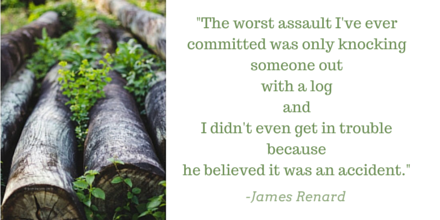 Now that’s been cleared up, I can answer your question. My conception of a successful psychopath is one who is able to adequately function in society. He or she has or is working toward a productive career with a decent salary, he is able to fulfil his physical, sexual and emotional needs, she does not behave in a way that will get her incarcerated. Unsuccessful psychopaths live on the margins of society, unable to control their behaviour or to fit in, or are currently behind bars for long periods of time. Successful psychopaths live within society, benefit from it and provide it with benefits. Some of them, as we know, get to shape and change their society due to the position they have attained within it. This is my definition of the most successful psychopaths.
Now that’s been cleared up, I can answer your question. My conception of a successful psychopath is one who is able to adequately function in society. He or she has or is working toward a productive career with a decent salary, he is able to fulfil his physical, sexual and emotional needs, she does not behave in a way that will get her incarcerated. Unsuccessful psychopaths live on the margins of society, unable to control their behaviour or to fit in, or are currently behind bars for long periods of time. Successful psychopaths live within society, benefit from it and provide it with benefits. Some of them, as we know, get to shape and change their society due to the position they have attained within it. This is my definition of the most successful psychopaths.
Just to clarify things further, you have said quite clearly what your definition of success does not include, and I have explained my opposition to that particular view, but would you mind giving a definition of what does constitute success in your mind?
Tina: I am one of those hippies that does not admire people simply because they are titled in any regard, whether that be a CEO or some kind of royalty. A person is successful by achieving a goal by their own work, on their own merit, and they are not successful when they get something through inheritance, secret manipulations, or abuse. I look down on deceivers, even more so than I look down on people who do not try. At least people who do not try are not causing pain. There needs to be another word besides “success” that defines a person who steps on another to achieve their appearance of phony success. Maybe Phuccessful.
Ok, returning to psychopaths…
What you have described as a successful psychopath is just a regular member of society. Apparently the psychopathy makes success in that regard a constant struggle. For a psychopath, it takes a concerted effort to just be a member of society?
I agree with you on that point, but the underlying aggravant to me is that the so-called successful psychopaths of today are merely successful at hiding their psychopathy. They are taking advantage of people’s ignorance by pretending to be of the same mindset. To be truly successful, in my opinion, would be to go forward into the world with your psychopathy well-known, and actually be a regular member of society, not a pretender. For example, Sam Vaknin and James Fallon have found ways to be successful. I am not talking about the fame, but rather the fact that they must forever more interact with other people without the secrecy.
James: Sorry, not letting that first point go just yet! I agree completely people who inherit titles or privileges are not benefiting from their own success. But I have to disagree with you that manipulators are not deserving of their success. It is after all, in your own words, “by their own work and on their own merit”. If one of my skills happens to be that I am good at manipulation, that skill can contribute to my success regardless of how your morals sit with it. Success is not defined as being admired by Tina Taylor. Success is having (enough) happiness, fulfilment, wealth, power or status (to satisfy yourself). (I say ‘or’ because different things attract different people. I am not too concerned about either wealth or status but I sure do covet the other three).
So, back to psychopaths…
Yes, we are in agreement here. If a psychopath can lead an ordinary (or an extraordinary) life without being imprisoned, then he or she is successful, in my books at least. However, in order to do that we are unfortunately obligated by society to remain hidden. The way I naturally would like to behave and the things I would truthfully like to say do not reflect society’s expectation of me and would result at best in my exclusion and at worst in my incarceration.
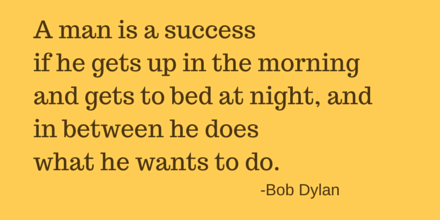
Nah, scratch that. The worst case scenario is that I would be murdered at the hands of an angry mob of normals. The way to be a “regular member of society” is not in my case total honesty, it is to lie and pretend. If I was being completely myself right now, I would be writing more or less the same thing, but it would resemble the word soup of my ‘stream of thought’ post and there would be a lot more expletives; I would be typing every insult to you that is running through my head as they occur to me. But, you wouldn’t like that. It would spoil the working relationship we have. And it would not be in keeping with the spirit of a reasoned debate. In the same way, if I was entirely honest in my every action and sentence, I would be a long way out of what society deems acceptable. For society, lying is not the problem, it’s everything else. My dishonesty is as much for society’s benefit as it is my own. Do you understand?
With regard to your specific examples, Sam Vaknin is not publicly a psychopath. The filmmaker of I, Psychopath [Ian Walker] clearly thinks he is, and the way the film depicts him we’re left in little doubt that he is one, but Vaknin himself does not claim the title. In his own words, he is a ‘malignant narcissist’, which as we know means more or less the same thing as ‘psychopath’, but in the eyes of the public there is a difference. The film also shows that despite people knowing he’s a narcissist or psychopath or even both, he still controls his long-term partner’s every thought and still plays manipulative games with the filmmaker. Your idea that the games would stop if only psychopaths could admit what they are is a fantasy. Look at the film, Vaknin says “I am a narcissist” into the camera, gets diagnosed with ASPD on camera, and talks about his condition with the filmmaker, but still charms, bullies and manipulates him whenever he can.
Then we’ve got James Fallon (Jim Fallon? Jimmy Fallon? That would be a turn up for the books…). He was already a well-known and well-respected neurobiologist (or whatever he is) before he ‘discovered’ he was a psychopath. And, like Vaknin, he subsequently made a career on the back of his discovery plus the fact that he has the expertise to (claim) to be making a difference to people’s lives and contributing to the total sum of knowledge of the condition.
I do not have that luxury. Neither does almost every other psychopath. My academic specialisms are philosophy and the French language. Can I use my psychopathy to be better in these fields? Certainly. Would my public declaration that I am a psychopath help my career, or would it in fact destroy it before it has even properly begun? Vaknin can say “I am a narcissist, but don’t worry because I am actually using my personal insight into my condition to be one of the leading voices on… what topic again?? Ah yes, narcissism!” Fallon can say “I am a psychopath, but don’t worry because I am actually using my personal insight into the condition to improve my chosen field of work which oops! just happens to be the study of psychopathic brains!” Contrast with my situation, as an example for the situation of most psychopaths. I cannot say “I am a psychopath, but don’t worry because I am using my personal insight into the condition to translate this French legal document into English for you.” So my success does not just benefit from dishonesty, it depends on it.
If that isn’t enough to be sinking your teeth into for now, let me raise a further point which could perhaps determine where this conversation goes next. I am not completely defeatist. I am not arguing that just because it is currently nigh on impossible for psychopaths to live openly, it will always be so. It’s a societal issue like any others. If attitudes change, if people are educated, it could happen.
As a side note, have you ever considered the increasingly psychopathic nature of society that you have noted is part of that change in attitude?
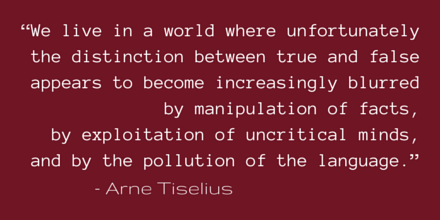
Tina: I have noted the lack of empathy in society, but I don’t think it is increasing. I think people in general are the same as always – oblivious and aloof, except for caring about their community circle of friends and family. I saw a poll that says 45% of people support the drone bombing of other countries to fight ISIS. Would those same people support the bombing of their neighbors because the Charles Manson cult was suspected of hiding in the neighborhood? People can be very shitty when it comes to “outsiders”.
I do happen to think that the number of psychopathic leaders are increasing. I think that the number of psychopathic ideas being forced upon us by mass media is increasing – and that has a lot to do with the psychopaths who own the media.
It is not morals, nor a sense of fairness, nor envy that have me anti-manipulation. Stomping on manipulators is survival instinct. People want to eliminate psychopaths, not because it is the moral thing to do, but because the manipulation is life-threatening. Since phuccess is dependent on threats, it is not just Tina Taylor who disagrees. You don’t even like manipulation, nor threats, yourself.
James: So I’m concerned that we’re getting seriously off-topic here, that is to say no longer discussing how psychopaths can be successful in society. Perhaps that is my fault for posing the question I did at the end, but all the same none of what you just wrote is a response to (or even an acknowledgement of) what I said about psychopaths needing to lie to stay hidden. Instead we’ve gone all violent, talking about “eliminating psychopaths”, “stomping on manipulators” and using a made-up word with dubious connotations.
Tina: I already gave my opinion on psychopaths remaining hidden. It is what psychopaths are successful doing. It is what psychopaths will try to continue doing, because that is the crux of your success. If I was in your boat, I would not want to stop hiding, either.
In your own words,
” I would be writing more or less the same thing, but it would resemble the word soup of my ‘stream of thought’ post and there would be a lot more expletives; I would be typing every insult to you that is running through my head as they occur to me. But, you wouldn’t like that.”
Nobody likes that, whether they are psychopaths or not. You are trying to control yourself, however I feel free to express myself as I am. I believe that you have a skewed interpretation of the world – thinking that society is holding you back, when it is really coming from yourself. I, myself, am free to write things “talking about “eliminating psychopaths”, “stomping on manipulators” and using a made-up word with dubious connotations.” Should I stop? Why? Because you don’t like it? Because society doesn’t like it? Note how you are the one trying to be “proper”. Why is that?
Let’s go to the childhood upbringing. Successful psychopaths learn to hide their lack of empathy and conscience from an early age. What develops after that? Holding yourself to an extreme form of controlled behavior and blaming it on society?
James: “I already gave my opinion on psychopaths remaining hidden.” Yes, in a private exchange. Not in this discussion, which is supposed to be made public at the end of all this.
Alright, we’re back on track, though I note a change in your tone that means I’ve irritated you somewhat. It’s fine, you’ll probably deny it in your next reply, but I know it’s there. I digress.
“Nobody likes that, whether they are psychopaths or not.” – Well that was my point, people wouldn’t like the completely honest version of me. But let me clarify something. I don’t think society is holding me back, I’m still going to be successful, with or without a ‘coming out party’. Yes there are certain limits on my behaviour, just as there are different limits on yours, but I can live with that. And I don’t blame society for the way it is; even so I can wish it to be different.
“What develops after that?” Simple, we learn how to mimic other people’s behaviour and to appeal to their needs and desires. Yes, this is necessary for ‘social survival’. No, I don’t especially like it. But I have benefited from it enormously. A turning point for me was when I worked out how to make people laugh. Intentionally and consistently I mean. Of course I’d done it before, but it was always hit-and-miss and often unintentional. And that didn’t come until surprisingly late, I was probably 15 or 16. So afterwards, once I could have people in stitches on a whim, the other things like charm and social grace and all that bullshit slotted into place. There is no better way to dehumanise someone than by realising you can control their thoughts and feelings through words alone.
It would be natural for me to end on a question to pose you. Since I don’t have one, perhaps we are nearing the end of this discussion? I’ll let you have the last word on the matter, that is if you yourself have no further questions.
Tina: I really don’t feel irritation. I am just blunt and succinct by nature. In fact, my father (a phuccessful psychopath) was the one who was irritated with me at age 13 when he said, “You are too truthful.” Many people don’t like the way that I talk because it “hurts feelings.” The truth hurts. That is not something that you, nor anyone else, has any influence on. It is all me, I am unique, and I like it.
(It is odd that psychopaths don’t latch onto that fact, – if you want to hurt someone, just tell them the truth. I don’t like to hurt people. So, why don’t I curb myself and lie more? I like to be myself more than I like to please others’ sensibilities.)
So, your view is that people wouldn’t like the completely honest version of you. The honest version of you enjoys dehumanising people. You would not be able to dehumanise people if they knew that was your intention. In private, you told me some things that reveals that you have caused grievous emotional harm to other humans. Unsuccessful psychopaths are not liked because everyone can see their antisocial side. My conclusion, therefore, is that your success at being secretly antisocial depends on your acting ability.
Were you even tempted to go run amok and leave an undeniable path of violent destruction? Is there a point in time of your childhood when you made a conscious decision to care about your life direction? What is your ultimate motivation to be successful by your definition? (I was going to ask you why some psychopaths don’t concern themselves with being liked, but antisocial behavior is not a domain of psychopaths only.)
James:
“(It is odd that psychopaths don’t latch onto that fact, – if you want to hurt someone, just tell them the truth.)”
Yes, and the ugly truth hurts even more when it follows a series of beautiful lies. Just remember that, if you ever change your mind about hurting people.
“The honest version of you enjoys dehumanising people”. Nah, I didn’t say that. The “dehumanising” line (“There is no better way to dehumanise someone than by realising you can control their thoughts and feelings through words alone.”) refers to how people can be dehumanised in your head, i.e. they become less than human in your eyes. It’s not something that actually happens to someone else. Sorry that wasn’t clear before, I was touch and go on the wording of that particular sentence and it looks like I got it wrong.
“In private, you told me some things that reveals that you have caused grievous emotional harm to other humans.” Did I? What was that then? You can publish me word-for-word, if you can find the text.
Your conclusion is on the mark, however. I am still tempted to this day, Tina, but I have committed to living life free and happy so I restrain myself. Actually the time I decided was just before I learned how to make people laugh, in fact it was the catalyst for that discovery. When I realised the negative consequences my poor behaviour was having on my well-being (namely, people were starting to hate me for being a ‘creep’, frightened of the physical pain I enjoyed causing, among other things), I turned things around.
“What is your ultimate motivation to be successful by your definition?” What does that mean? Are you missing some punctuation or is it just poorly written altogether?”
(I was going to ask you why some psychopaths don’t concern themselves with being liked, but antisocial behavior is not a domain of psychopaths only.)” Very true, it is not. As for what I’d have said, I couldn’t care less what other psychopaths concern themselves with; that’s not my business.
Tina: That was a poorly written question, but you got the gist of it. It was answered by your commitment to living free and happy.
In some of our email exchanges, you had revealed the grievous harm of changing someone’s life path for the worse.
(You had written, “Just a shame the ladies on LoveFraud can’t do the same as you; get over it and stop being bitter that you lost years after the fact.”)
I replied: “It took me 10 years to get to this point and I will never “get over it”, so I can’t fault the people who are suffering endlessly. The consequences of loving a psychopath are forever. Every facet of my life was adversely affected. I had big plans. I had goals. I had dreams. I had hopes. I thought I was making progress in life, only to discover an all-encompassing scam. People like me (neurotypical) have an identity that is firm we don’t have the luxury that you do to change on a whim. My life decisions, very important directions I was taking in my life, were based on false information. It all could have been avoided. There was absolutely NO REASON for the trickery. It’s not just a few lies, it’s a whole illusion. My identity was flushed down the toilet and the man is lucky to be alive.”
And your response: “
OK, point taken, it’s hard work to recover. That would explain why my last one dropped out of her degree in our excellent university.”
Formerly titled ” Phuccessful Psychopaths (Who are they?)”
Peter Pan and Captain Hook Photo courtesy gavinodd’s Bucket
Little Red Riding Hood and Big Bad Wolf photo courtesy of PsychopathsandLove

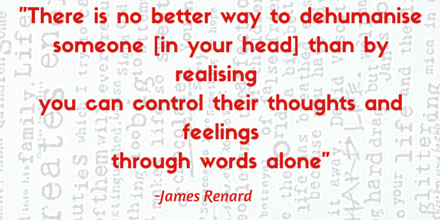
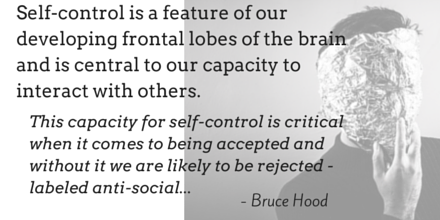
James 12:23 on May 20, 2015 Permalink |
Haha, you got me! Alright, thanks for an interesting discussion, that was good.
LikeLiked by 2 people
@GeneticPsycho (Tina) 12:32 on May 20, 2015 Permalink |
Thank you, too!
LikeLiked by 1 person
@GeneticPsycho (Tina) 15:03 on May 20, 2015 Permalink |
I think we should have screamed obscenities at each other in true stereotypical troll fashion. No true psychopath would be so civilized. 🙂
LikeLiked by 2 people
James 16:11 on May 20, 2015 Permalink |
There’s still time, bitch.
LikeLiked by 1 person
Are you my next target? | No Psychos, No Druggies, No Stooges 07:26 on May 22, 2015 Permalink |
[…] What makes a successful psychopath? […]
LikeLike
Free to Choose | CLUSTER B 10:47 on November 11, 2016 Permalink |
[…] What Makes a Successful Psychopath? a dialog by James Renard and Tina Taylor […]
LikeLike
Gol D Roger 13:32 on July 7, 2017 Permalink |
This thread is so stupid…
Rookie psychos – Hannibal Lector , Vampire of Dusseldorf who are despised
Legendary Psychos – Alexander the Great , Julius Caeser , Genghis khan who are worshipped
LikeLike